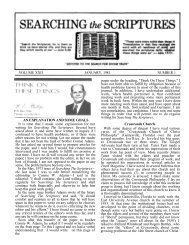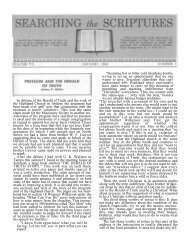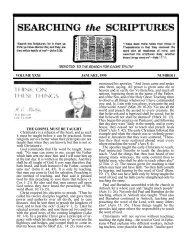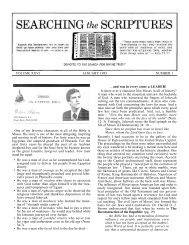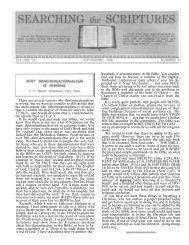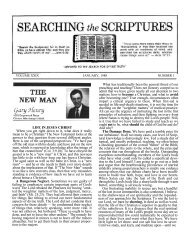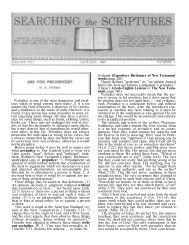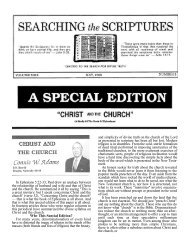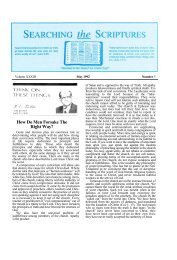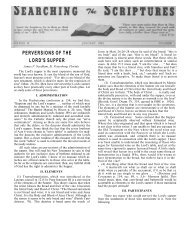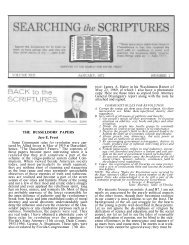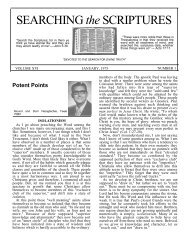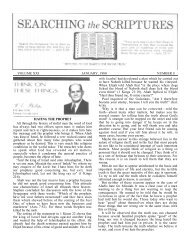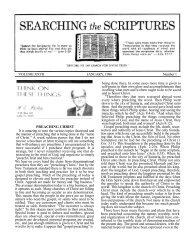Volume 18 – 1977 (PDF) - Searching The Scriptures
Volume 18 – 1977 (PDF) - Searching The Scriptures
Volume 18 – 1977 (PDF) - Searching The Scriptures
Create successful ePaper yourself
Turn your PDF publications into a flip-book with our unique Google optimized e-Paper software.
THE UNPARDONABLE SIN<br />
"Wherefore I say unto you, All manner of sin and<br />
blasphemy shall be forgiven unto men: but the<br />
blasphemy against the Holy Ghost, shall not be<br />
forgiven unto men. And whosoever speaketh a word<br />
against the Son of man, it shall be forgiven him: but<br />
whosoever speaketh against the Holy Ghost, it shall<br />
not be forgiven him, neither in this world, neither in<br />
the world to come" (Mt. 12:31-32).<br />
Notice the particulars of the text. (1) All manner of<br />
blasphemy shall be forgiven, except the blasphemy<br />
against the Holy Ghost. (2) Whosoever speaketh<br />
against Christ, it shall be forgiven him, but<br />
whosoever speaketh against the Holy Ghost, it shall<br />
not be forgiven him. (3) This blasphemy against the<br />
Spirit shall not be forgiven in this world nor in the<br />
world to come.<br />
Why is blasphemy against the Spirit worse than<br />
other forms of blasphemy? What is the difference in<br />
blaspheming Jesus and blaspheming the Holy Ghost,<br />
since both are deity? <strong>The</strong>se questions, and others, we<br />
will endeavor to answer as we pursue this study, but<br />
before we delve into this, let's consider different<br />
interpretations which have been offered.<br />
Different Views<br />
(1) Attributing the miracles of Jesus to the power of<br />
the Devil. <strong>The</strong> Pharisees had accused Jesus of<br />
casting out devils by the power of Beelzebub (Mt.<br />
12:24). <strong>The</strong> parallel account in Mark seems to<br />
identify the charge, "He hath an unclean spirit," as<br />
the blasphemy against the Holy Ghost (Mk. 3:30).<br />
R. C. Foster makes the observation in reference to<br />
Mk. 3:30 that this is a broken sentence. "But those<br />
who insist this is positive proof overlook the fact that<br />
this is a broken sentence. What is the connection in<br />
grammatical structure? To what shall we relate the<br />
words because they said? Does this mean that the<br />
entire discussion arose because they had said Jesus<br />
was in the possession of the devil? or does it affirm<br />
an absolute identification of the sin?" (<strong>The</strong> Middle<br />
Period, p.67). My persuasion is that the statement<br />
precipitated the discussion, rather than it being an<br />
identification of the sin.<br />
This same charge of Jesus having a devil was made<br />
about a year later. We read, "<strong>The</strong>n answered the<br />
Jews, and said unto him, Say we not well that thou<br />
art a Samaritan, and hast a devil" (Jn. 8:48)? In<br />
verse 52, the Jews again said, "Now we know that<br />
thou hast a devil." Later, the Jews again said, "He<br />
Page 11<br />
hath a devil, and is mad; why hear ye him" (Jn.<br />
10:20).<br />
Apparently, these same Jews who had charged<br />
Jesus with having a devil, were the ones who had<br />
him crucified. Yet, Jesus prays, "Father, forgive<br />
them; for they know not what they do" (Lk. 23:34).<br />
This prayer was answered when multitudes of the<br />
Jews obeyed the gospel on Pentecost (Acts 2:22-41).<br />
Attributing the miracles of Jesus to the power of<br />
the devil was not, therefore, the unpardonable sin.<br />
<strong>The</strong>ir sin was blaspheming Jesus rather than<br />
blaspheming the Holy Spirit of which Jesus spoke.<br />
(2) A specific act. If the sin is a particular act,<br />
what is it? Surely God would have told us if there is a<br />
specific sin for which there is no forgiveness once it<br />
has been committed. It is not murder because the<br />
Jews on Pentecost were forgiven for murdering the<br />
Son of God. It is not fornication, idolatry,<br />
homosexuality, etc., as the Corinthians were forgiven<br />
of these things (I Cor. 6:9-11).<br />
Actually, there is no sin too heinous or grave that<br />
God will not forgive if a person wants forgiveness. It<br />
is a matter of meeting God's conditions and then the<br />
blood of Christ will cleanse us from all sins. <strong>The</strong>re is<br />
power in the blood.<br />
(3) Rejection of the invitation. This position fails<br />
to consider the word, "blaspheme," and the ex-<br />
pression, "speaketh against." A person who rejects<br />
the gospel invitation has not spoken against, or railed<br />
or insulted the Holy Ghost. He may be a believer in<br />
God, Christ and the Holy Spirit and esteem the<br />
<strong>Scriptures</strong> as the word of God, yet reject the in-<br />
vitation for sundry reasons. Has he committed the<br />
sin of blaspheming the Spirit of which Jesus spoke?<br />
Certainly not!<br />
It is granted that his sins are unforgiven, and<br />
should he die, he would be lost, but this is not what<br />
Jesus was talking about. Not coming forward when<br />
the invitation is sung is not the blasphemy against<br />
the Holy Ghost. <strong>The</strong>re are those who are almost but<br />
not altogether persuaded to come to the Lord who<br />
would not say a word against Christ or the Holy<br />
Spirit.<br />
(4) A repudiation of the Spirit's testimony in the<br />
gospel age. This position, in my estimation, is more<br />
tenable to the overall picture of biblical teaching,<br />
both contextually and generally. Let us look at the<br />
evidence to justify this position.<br />
Repudiation of Testimony<br />
We are now living in the Holy Spirit dispensation.<br />
Jesus said, "I will pray the Father, and he will give<br />
you another Comforter. . . . he shall teach you all<br />
things, and bring all things to your remembrance,<br />
whatsoever I have said unto you" (Jn. 14:16, 26).<br />
"And when he is come, he will reprove the world of<br />
sin, and of righteousness, and of judgment. . . . he<br />
will guide you into all truth. . . ." (Jn. 16:8, 13).<br />
This Spirit dispensation, the gospel age, is man's<br />
last and only means of salvation. <strong>The</strong>re is not going<br />
to be any more. He who would repudiate the Holy<br />
Spirit (cast off, disown, renounce, speak against,<br />
insult, the testimony of the Spirit) hath no<br />
forgiveness in this world (gospel age) or the world to



